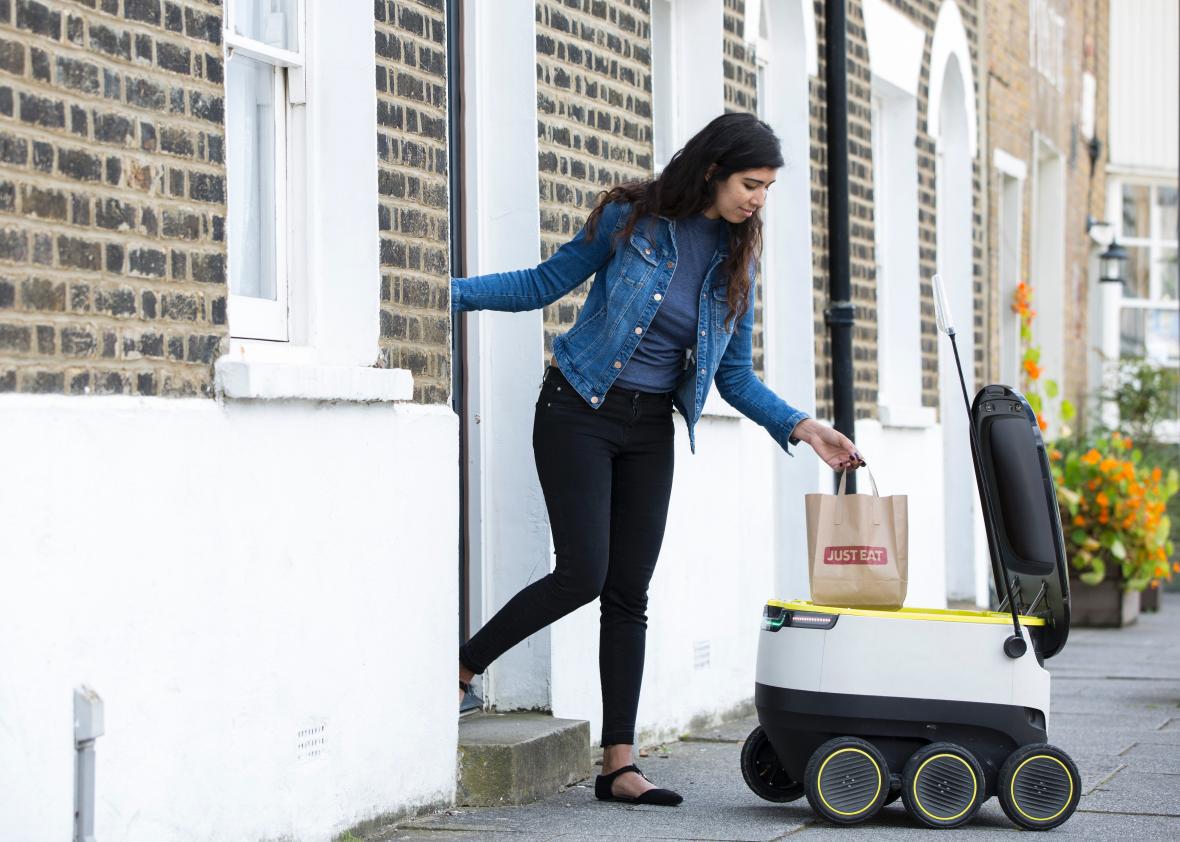One San Francisco elected official is on the warpath against food-delivery robots. As reported by Recode, Norman Yee, one of the 11 elected representatives who make up the San Francisco Board of Supervisors, proposed legislation on Tuesday to ban the autonomous vehicles from the sidewalks of the city by the bay. Yee’s office had previously looked into administrative ways to curb autonomous delivery services, apparently out of concerns that the squat, boxy robots—which trundle along at a mean 4 miles per hour—could barrel over elderly pedestrians, people with disabilities, or children.
“Our streets and our sidewalks are made for people, not robots,” Yee told Recode. “This is consistent with how we operate in the city, where we don’t allow bikes or skateboards on sidewalks.” And as the supervisor added to the San Francisco Examiner (beneath the lede “Adios, R2-D2”), “I’m doing this because I do care about safety, and it’s something that could endanger our pedestrians, especially ones who are vulnerable.”
Envisioned as a less-obtrusive alternative to Amazon’s drone grocery-delivery program (which dropped off its first customer package in the United Kingdom last December), and other delivery services like UberEATS designed to disrupt the takeout industry, the robots have already made their six-wheeled mark on U.S. cities. According to Recode, they are designed like mobile coolers to deliver “meals, groceries, and other on-demand goods.” A system of cameras and lasers helps them stay on track and dodge pedestrians; indeed, as Wired’s Matt Simon notes, the safety concerns Yee cites “remain almost entirely hypothetical.”
Yee’s concerns also run counter to an emergent legislative trend. As Recode reported last month, both Virginia and Idaho recently passed laws permitting delivery robots to operate statewide, and similar legislation is currently being considered in Wisconsin and Florida. Under the Virginia law, the first of its kind in the United States, the robots are required to heed all traffic lights and pedestrian signs, weigh under 50 pounds, run under 10 miles per hour, and feature plates with their owner’s contact information, TechNewsWorld reports. (Naturally, the London- and Estonia-based Starship Technologies, a chief delivery-robot company founded in 2014 by two members of the team that created Skype, heavily pushed the law.)
Ensuring full compliance with such regulations became a sticking point after conversations with the San Francisco Police Department, Yee said. The supervisor claims that talks with Starship as well as Marble and Dispatch, three of the highest-profile autonomous delivery companies in the San Francisco area, failed to allay those concerns. “I came to the conclusion that if we can’t enforce regulations, then we should just ban [the robots],” he told Recode. Yee also expressed fears that the robots could eventually take a bite out of the job market for delivering goods.
The bill, which could levy criminal, civil, and administrative penalties of up to $1,000 for unauthorized delivery-robot use if passed, has received support from San Francisco Police Commander Robert O’Sullivan and the pedestrian advocacy group Walk SF. But even if it fails to win the full board’s approval next month, it won’t be the only pushback these delivery bots have faced in San Francisco. Although the vehicles are only partially autonomous, still requiring human oversight from afar to ensure nothing goes wrong, the San Francisco Department of Public Works granted Starship only a partial license to operate them on the city’s streets, issuing a temporary occupancy permit to test the technology last September.
But onward goes the march of progress. In March, Starship partnered with Postmates to deliver food ordered online in Washington, D.C., and its robots are currently being tested by the on-demand delivery service DoorDash in Redwood City, California, 30 miles south of San Francisco. The company, which secured $17.2 million in seed funding last January, claims to be making deliveries in 56 cities in 16 countries worldwide, according to TechWorldNews. One of its competitors, Marble, launched a robot delivery pilot program in San Francisco’s Mission and Protero Hill neighborhoods in partnership with Yelp’s Eat24 food-delivery service last month. In response to Yee’s legislation, a Starship spokesperson told Recode that the company has received “positive feedback unanimously from cities we’re currently operating in around the world.”
And even if Yee’s bill passes, it may be too late to put the brakes on autonomous delivery vehicles. “It’s not a question of if [delivery robots are] coming, it’s a question of how soon,” Jim McGregor, a principal analyst at Tirias Research, a technology research and advisory firm, told TechNewsWorld in March. Delivering goods “is one of those applications where it’s often difficult to hire people—and sometimes impractical as the minimum wage increases. Eventually it’ll just be cheaper and more reliable to use drones for tasks like this.”
